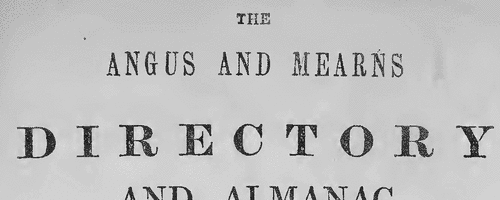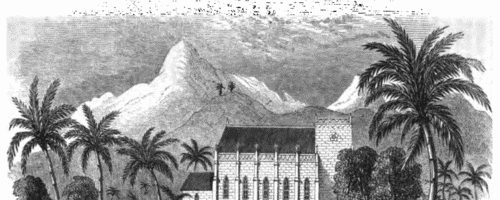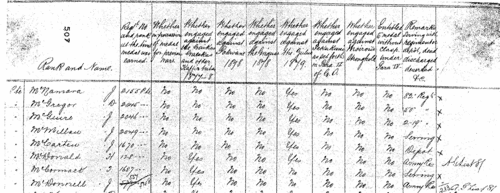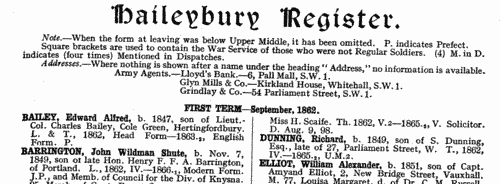Add this eBook to your basket to receive access to all 55 records. Our indexes include entries for the spelling pitter. In the period you have requested, we have the following 55 records (displaying 31 to 40): These sample scans are from the original record. You will get scans of the full pages or articles where the surname you searched for has been found. Your web browser may prevent the sample windows from opening; in this case please change your browser settings to allow pop-up windows from this site. Inhabitants of Montrose (1847)
This alphabetical directory gives full names, occupation and address.
| Sample scan, click to enlarge

| Deaths, Marriages, News and Promotions
(1848)
Death notices and obituaries, marriage and birth notices, civil and military promotions, clerical preferments and domestic occurrences, as reported in the Gentleman's Magazine. Mostly from England and Wales, but items from Ireland, Scotland and abroad. July to December 1848. | Sample scan, click to enlarge

| Missionary donations from Devon
(1855)
The Congregational and a number of other independent churches together formed the Evangelical Alliance, committed to promoting and supporting missions to the heathen. The areas chosen for their projects were Guiana, South Africa, India, the South Seas and China. The work of the missionaries was not only in preaching the Gospel, but also in translating the Bible into local languages, and establishing churches, schools and orphanages. Orphans and native teachers were often given the names of principal contributors or congregations back in Britain. In Britain the large amounts of money needed for this work were raised among the Congregational and independent congregations, arranged by auxiliaries for each county (although some contributions for each county might in fact come in from congregations and individuals in neighbouring areas); money was gathered by ministers, at special services, by supporters, and in missionary boxes. The accounts of all these contributions were published as part of a monthly magazine called the Evangelical Magazine. Each issue of the magazine carried obituaries of prominent members of the congregations; general articles on religion; reviews of newly-published religious books; home news, mainly about meetings of importance or interest by the alliance or in individual churches; and then a separate section called the Missionary Chronicle. The Missionary Chronicle was devoted to letters and reports from the missionaries; and concludes with a set of accounts of donations towards the missionary work. This is the index to the donations reported in the magazine, January to December 1855, from Devon. | Sample scan, click to enlarge

|  London Policemen
(1843-1857) London Policemen
(1843-1857)
The Metropolitan Police Register of Joiners (MEPO 4/334) lists policemen joining the force 1 January 1843 to 1 April 1857 (warrant numbers 19893 to 35804). The register is alphabetical, in so far as the recruits are listed chronologically grouped under first letter of surname. It gives Date of Appointment, Name, Number of Warrant, Cause of Removal from Force (resigned, dismissed, promoted or died), and Date of Removal. Although the register was closed for new entrants at the end of 1842, the details of removals were always recorded, some being twenty or more years later. Those recruits not formerly in the police, the army, or some government department, were required to provide (normally) at least two letters of recommendation from persons of standing, and details of these are entered on the facing pages: the names in these are indexed separately - this index refers only to the police constables. Where a recruit was only recently arrived in the metropolis, the names and addresses of the recommenders can be invaluable for tracing where he came from. | Sample scan, click to enlarge

| Customs Officers in London
(1858)
Complete lists of serving customs officers and clerks in the Port of London and all the outports of Britain and Ireland (including the Isle of Man and the Channel Islands) were published each year in The British Tariff. This issue is corrected to 30 September 1858: the sample scan shows the entry for Hartlepool. | Sample scan, click to enlarge

| Long-stay Paupers in Workhouses: Reading
(1861)
This comprehensive return by the Poor Law Board for England and Wales in July 1861 revealed that of the 67,800 paupers aged 16 or over, exclusive of vagrants, then in the Board's workhouses, 14,216 (6,569 men, 7,647 women) had been inmates for a continuous period of five years and upwards. The return lists all these long-stay inmates from each of the 626 workhouses that had been existence for five years and more, giving full name; the amount of time that each had been in the workhouse (years and months); the reason assigned why the pauper in each case was unable to sustain himself or herself; and whether or not the pauper had been brought up in a district or workhouse school (very few had). The commonest reasons given for this long stay in the workhouse were: old age and infirm (3,331); infirm (2,565); idiot (1,565); weak mind (1,026); imbecile (997); and illness (493). | Sample scan, click to enlarge

| Private Residents of Birmingham and Suburbs
(1878)
The Post Office Directory of Birmingham with its Suburbs, edited by E. R. Kelly, and published in 1878, has two main alphabetical lists - Court and Commercial. The suburbs included are Aston, Bickenhill Park, Birchfield End, Castle Bromwich, Erdington, Saltley (with Washwood Heath), Ward End (including Little Bromwich) and Witton, in Warwickshire; Handsworth (with Soho), Harborne, Perry Barr and Smethwick, in Staffordshire; and King's Heath, King's Norton, Moseley, Northfield, Selly Oak and Yardley (including Hall Green and Stechford) in Worcestershire. The Court section, indexed here, lists nobility, gentry, clergy, and private residents in general. | Sample scan, click to enlarge

|  Men of the Royal Engineers fighting in South Africa
(1877-1879) Men of the Royal Engineers fighting in South Africa
(1877-1879)
What is commonly called the Zulu War Medal was awarded to those British soldiers who fought in a series of conflicts in southern Africa from 1877 (the Kaffir War) through to 1879 (the Zulu War). In 1880 the various units submitted returns of the officers, non-commissioned officers and men 'entitled to the Medal for Military Operations in South Africa during 1877-8-9' and these 'medal rolls' are now in the National Archives. The returns are made with the information arranged in twelve columns:
1. Rank and name
2. Regimental number and rank at the time the medal was earned
3. Whether in possession of medal for previous wars
4. Whether engaged against the Gaikas, Galekas and other Kaffir tribes 1877-8
5. Whether engaged against Pokwane 1878
6. Whether engaged against the Griquas 1878
7. Whether engaged against the Zulus 1879
8. Whether engaged against Sekukuni as set forth in Par. 2. G. O.
9. Whether engaged against Moirosi's stronghold
10. Entitled to medal without clasp under Par. 4.
11. Serving with regiment, depot, dead, discharged, deserted, &c.
12. Notes and cross-references to the Adjutant-General's medal lists.
WO 100/46.
| Sample scan, click to enlarge

| Missing Next-of-Kin and Heirs-at-Law
(1880)
The Unclaimed Money Registry and Next-of-Kin Advertisement Office of F. H. Dougal & Co., on the Strand in London, published a comprehensive 'Index to Advertisements for Next of Kin, Heirs at Law, Legatees, &c., &c., who have been Advertised for to Claim Money and Property in Great Britain and all Parts of the World; also Annuitants, Shareholders, Intestates, Testators, Missing Friends, Creditors or their Representatives, Claimants, Unclaimed and Reclaimed Dividends and Stock, Citations, Administrations, Rewards for Certificates, Wills, Advertisements, &c., Claims, Unclaimed Balances, Packages, Addresses, Parish Clerks' Notices, Foreign Intestates, &c., &c.' The original list was compiled about 1860, but from materials dating back even into the 18th century: most of the references belong to 1850 to 1880. For each entry only a name is given, sometimes with a placename added in brackets: there may be a reference number, but there is no key by which the original advertisement may be traced. The enquirer of the time had to remit £1 for a 'Full and Authentic Copy of the Original Advertisement, together with name and date of newspaper in which the same appeared'. | Sample scan, click to enlarge

| Boys entering Haileybury College, Hertfordshire
(1882)
Haileybury College, near Hertford, was founded by the East India Company in 1806, and incorporated by Royal Charter in 1864. This register of pupils entering the school from 1862 to 1931 was edited by a master there, Laurence Arthur Speakman. The boys are listed by term of joining the school, and then alphabetically by name (in bold), surname first (in capitals). There is then usually a precise birthdate, and the name and address of his father; his period at the school, starting with abbreviations to indicate the house to which he belonged (B., Batten; B. F., Bartle Frere; C., Colvin; E., Edmonstone; Ha., Hailey; Hi., Highfield; L., Lawrence; Le B., Le Bas; M., Melvill; Th., Thomason; T., Trevelyan), and the first and last forms attended (e. g., IV., fourth form). Where a member of a school team there is then an indication (e. g., XI., cricket). For some pupils, with whom the school had lost touch, Speakman was only able to record the details of their time at Haileybury; but for most a brief career synopsis is then given, and current address (as in 1931) or date of death.
| Sample scan, click to enlarge

|
Research your ancestry, family history, genealogy and one-name study by direct access to original records and archives indexed by surname.
|












